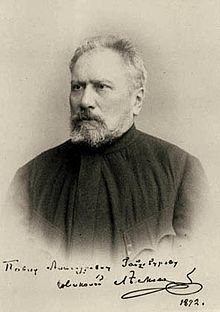The iron will (Nikolai Leskow)
The iron will ( Russian Железная воля , Schelesnaja wolja) is a satirical story by the Russian writer Nikolai Leskow , which was published in the St. Petersburg magazine Krugosor (Horizont) in 1876 .
1857-1860 Leskow worked for the Scott & Wilkins company. The engineer Krüger employed there is considered a role model for the protagonist Hugo Pektoralis. In this tragic comedy in prose , Leskow demonstrates the superiority of the work-shy, thoroughly drunk Russian Vasili Safronytsch over Mr. Pektoralis, a particularly principled, strong-willed German from Doberan on Lake Plauer .
content
The young engineer Hugo Pektoralis, a master of his trade, travels without any knowledge of Russian from Moscow in the rainy autumn by stagecoach to the deepest Russian province of R. ( Ischim is mentioned among others as probably quite distant neighboring town). Machines for steam and sawmills are to be set up and their operation monitored. The narrator - based on the above, the reader can imagine the author Leskow among them - works for a Russian mill construction import company. On the way from Vladimir , he meets Pektoralis at the post office of Vasilev Maidan. One of the first statements of the German: Although he had to submit to everything due to a lack of language skills, he would ultimately submit to everything in his vicinity.
In R. it can be seen that some machine parts from Germany cannot withstand the Russian stress. The parts that are still required are manufactured in R. in the gray foundry of an incredibly lazy small business owner Safronytsch. The engineer Pektoralis puts himself at the lathe and works if necessary. After half a year, Pektoralis wants to master Russian perfectly. That also works quite well. Sometimes things go wrong. When the engineer realizes his mistake, this stubborn man doesn't give in, but insists on the “correctness” of the mistake: for example, there is the matter of Russian tea. He wants to drink weak drinks, but forces himself down very hard for days and suffers a stroke. As I said, pectoralis has its principles. He does not want to marry his German bride until he has three thousand thalers together. When the time comes, Pektoralis frees the typically German Klara in Germany and brings her to R. The engineer always has a lot to do. Klara drives away the boredom with the machinist Ofenberg. This is Pektoralis' German factotum from Sarepta . After three years of “marriage”, Pektoralis finally wants to accomplish this - exactly at the point in time when, with an iron will, he saved up the money for his own machine factory in R. The marriage turns into a fight with Ofenberg. Clare is no longer a virgin. The girl had been unfaithful to the engineer with the machinist.
For his factory, Pektoralis acquires a site on which Safronytsch's foundry is partially located. The German engineer, who has become quite wealthy through diligent work, does not succeed in driving the almost bankrupt Russian small business owner away. Pectoralis has the only access through its courtyard nailed up. From now on, Safronytsch and his family climb over the fence to a friendlier (Russian) neighbor on the way out.
According to a court order, Pektoralis has to pay Safronych monthly compensation for loss of production. As a matter of principle, Germans cannot open the boarded-up gate and have to pay forever. Safronytsch's wife saves herself a beautiful new house right across the street from the contributions over the years. Pectoralis, victim of one's own firmness of principles, impoverished. The foundry owner no longer has to work at all. He shuts down the ovens, fires his workers, and usually gets drunk in the tavern. If he comes across Pectoralis, he mocks him: the engineer should live and pay long. Safronych would rather die than pectoralis. After his funeral, at his funeral feast, Pectoralis is said to eat plinsen and choke on it. That's why. Before that, the engineer had other bad luck. Klara runs away from him.
Quote
"Who offends Russians, God always punishes."
reception
- On the one hand, Leskow admired the German correctness, but on the other hand saw in it a threat to humanity . Reissner writes: "Pectoralis becomes a puppet of his own principles - his willpower turns into weakness and becomes stupid, and although his downfall has a hint of tragedy, the reader cannot and should not feel sympathy."
German-language editions
- The iron will. German by Günter Dalitz. P. 327–428 in Eberhard Reissner (Ed.): Nikolai Leskow: Collected works in individual volumes. The enchanted pilgrim. 771 pages. Rütten & Loening, Berlin 1969 (1st edition)
Used edition
- The iron will. German by Günter Dalitz . P. 5–102 in Eberhard Dieckmann (Ed.): Nikolai Leskow: Collected works in individual volumes. 4. The unbaptized priest. Stories. With a comment from the editor. 728 pages. Rütten & Loening, Berlin 1984 (1st edition)
Web links
- The text
- Wikisource : Железная воля (Лесков) (Russian)
- online at Lib.ru / Classic (Russian)
- online at RVB.ru (Russian)
- Entry in the Laboratory of Fantastics (Russian)
- Entry in WorldCat
Individual evidence
- ↑ Russian Кругозор
- ^ Dieckmann on p. 706 in the follow-up to the edition used
- ↑ Russian notes (Russian Примечания)
- ↑ Dieckmann in note 10 on p. 707 in the edition used
- ↑ Russian Василев Майдан, see the village community Василево-Майданский сельсовет
- ↑ Edition used, p. 99, 2. Zvo
- ^ Reissner, 1969 edition, p. 753, 2nd Zvu
